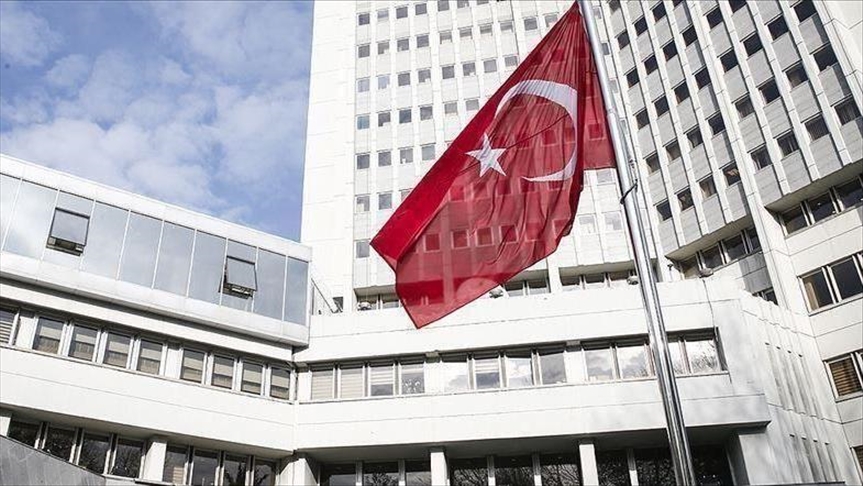OPINION - Turkey seeks to position itself according to realities of emerging new world order
As axis of history moves from Atlantic to Pacific, Turkey aptly consolidates multilateral dimension of its foreign policy

The author is a correspondent with Anadolu Agency’s English News department and a research fellow in history at Rome 2 University of Tor Vergata. His research interests include nationalism studies, transnational history, North American studies, modern Greek studies, Turkish/ Ottoman studies, and Turkish foreign policy.
ANKARA
Turkey has turned its back on the West, and is cozying up with extra-Western powers has been a popular notion in some circles in European and American media, academia, and governments. This highly popular narrative, which has manifested almost every day mostly through so-called policy papers, analyses, articles, opinion pieces, falls short in grasping the realities of the emerging new world order, if not deliberately distorting the facts.
The axis of world history already has been moving eastwards, from the Atlantic to the Pacific. The United States and Europe have lost economic ground to Asia, in terms of volumes of trade, investment, and growth. Asia’s share in global GDP in terms of purchasing power parity (PPP), rose to around 50% from 30% in 2000. By contrast, Europe and North America combined account for just 40% of global GDP (PPP) as of this year.
Similarly, Asian countries, particularly China, South Korea, and Singapore are increasingly turning into hubs of innovation and exporters of capital in the form of foreign direct investment and portfolio investments.
In parallel to its economic decline, Europe and America seem to have lost their capacities to guide and influence political developments, win wars and keep promises and commitments made to allies across the world. Armed forces in Europe underwent significant downsizing after the end of the Cold War in 1991 in parallel to huge reductions in defense budgets.
On the other hand, the US armed forces, which were modeled for fighting and winning conventional wars, engaged in costly and corrosive wars in Iraq and Afghanistan in the last 20 years without winning.
Meanwhile, North Korea became a nuclear power, Russia recovered from its turbulent decade and re-emerged as a major global power, if not a superpower, and China successfully modernized all branches of its armed forces and nuclear arsenal. Having witnessed the inability of the US to project power in the Pacific, led South Korea and Japan to think the US would not be willing to or able to defend them should things escalate to armed conflict in the region. Consequently, these two not only improved relations with extra-Western countries but also invested in developing their own arms industries.
What is more, inconsistencies between what the West promises and preaches and what it actually does erodes its credibility and hence its global influence. Western powers for decades kept warning other countries of not improving relations with Russia, and particularly China. Yet, they competed to export more to those countries and attract investment, especially from China.
Some recent developments are quite telling. Abandoning Afghanistan while knowing very well what the consequences would be, the US agreed to withdraw from Iraq as well.
Coming to power with a promise of a tougher stance against Russia, the Biden administration has been busy finding ways to manage relations with Russia even though it means alienating Ukraine, Poland, and the Baltic states. Big powers of the EU, namely Germany, France, and Italy, also favor better relations with Russia.
Germany particularly stands out within the EU regarding its strong strategic relations with China and Russia.
While all these have been happening, some in Europe and the US insist that Turkey’s desire to improve relations with Russia, China, and other Asian powers indicate that Ankara is plotting against the West.
Therefore, it would be useful to remember Turkish foreign policy’s multilateral and autonomous character which dates back to the 1960s when the Turkish government then financed the formation of Turkey’s heavy industrialization plans with cheap loans and technology provided by the Soviet Union. In the 1990s, while the threat from the terrorist organization PKK was at its peak and Turkey’s NATO allies, including the US, refused to provide even the most basic weaponry to keep Turkish citizens safe, Ankara purchased arms and technology from China, Korea, Singapore, and Pakistan.
More recently, some of Turkey’s major western allies left it to struggle alone against FETO, PKK, and Daesh/ISIS terror organizations by allowing terrorists to operate freely on their soil and imposing overt and covert arms embargoes. Moreover, the EU's openly pro-Greek biases in the Eastern Mediterranean undermine prospects for a peaceful and comprehensive solution to regional problems by encouraging Greece to pursue a provocative policy toward Turkey.
Meanwhile, Turkey fulfilled its NATO obligations and continued to be an essential member of the alliance by fulfilling its obligations such as sending F-16s to NATO’s Baltic Air Policing missions, contributing to forces in Afghanistan, Kosovo, and the Gulf of Aden, and agreeing to sell state-of-the-art Bayraktar UAVs to Poland, which is a NATO front state.
Turkey, as a growing country needs capital investments and export markets. It is also located in the midst of many conflict zones and wishes to have a strong and modern armed force.
Against this background, Ankara aptly follows a foreign policy that is in line with its interests as well as new realities of the world while still staying in the western bloc with which it maintains historically extensive economic, political and diplomatic bonds.
*Opinions expressed in this article are the author's own and do not necessarily reflect the editorial policy of Anadolu Agency.
Anadolu Agency website contains only a portion of the news stories offered to subscribers in the AA News Broadcasting System (HAS), and in summarized form. Please contact us for subscription options.

